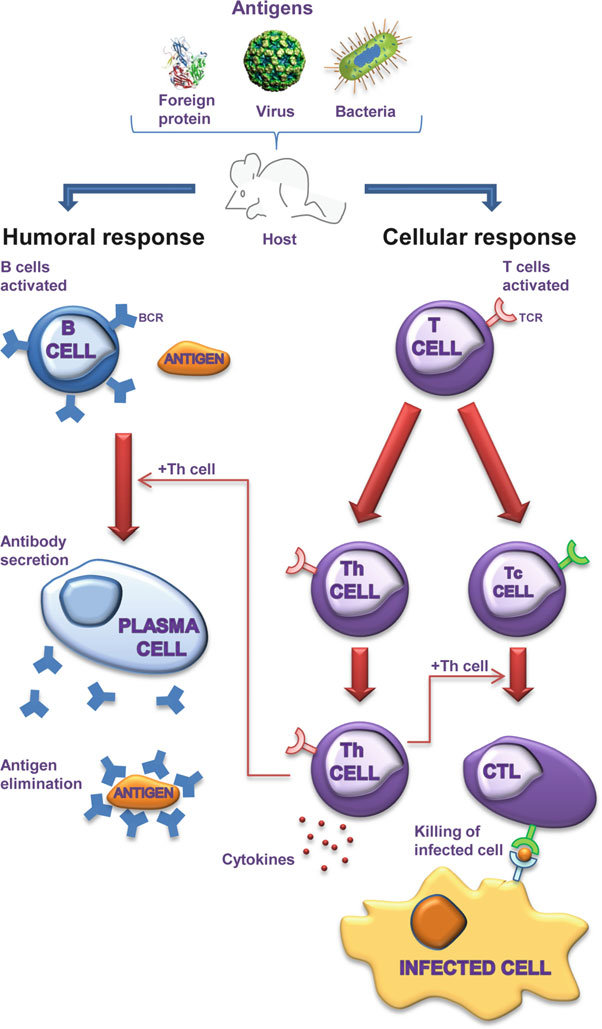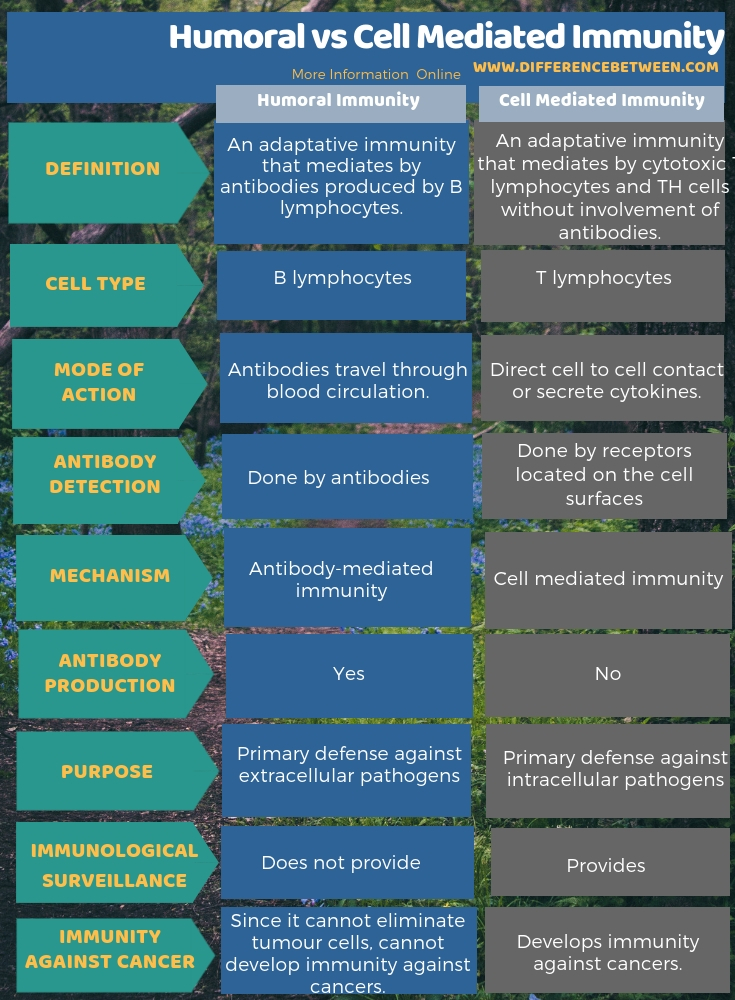Cell-mediated Immune Response Study Guide
Introduction
Cell-mediated immunity is a cellular immune response that works by activating macrophages and NK cells, and the release of cytokines in response to antigens. Unlike humoral immune responses, it does not make use of antibodies.
What is a Cell-Mediated Response?
Cell-mediated immunity (CMI) is mainly targeted at any antigens or pathogens that escape phagocytosis and other immune barriers. Its basic function is a cell-mediated cleaning mechanism. It is highly efficient at destroying viral cells, infected bacterial cells, and even cancerous cells. However, it also plays a major role in transplant rejection.
The response initially uses helper T cells, also denoted as ‘Th’ cells, that identify and regulate the complete cell-mediated response. There are two steps to activating a T cell response:
- Naive CD4 T-cells in the lymph nodes track infected cells with special antigen-presenting cells (APC) through their unique T-cell receptors (TCR). This is the first step toward activating the Th cell.
- Co-stimulatory molecules such as B7, CD40, and T cell activating cytokines, are the second step towards activating Th cells.
This activated helper T cell now recruits other immune cells such as macrophages to carry out the elimination of the pathogens.
- Activated macrophages are highly efficient in killing harmful pathogens, and are also mainly involved in the activation of cytotoxic CD8 T cells (also known as killer T cells – quite fitting!).
- Activated CD8 T cells kill pathogens by inducing programmed cell-death, aka, apoptosis.
Applications
-
CMI is used mainstream for organ transplants, grafting viruses, or to treat cases of autoimmune disease. Based on the exposure to antigen, CMI response peaks at 24-48 hrs.
-
CMI in immunology is a part of the immune system that helps start activating macrophages and NK cells to destroy intracellular pathogens and cancer. Immunology is a popular area of study in the treatment of cancer and many fatal autoimmune diseases.
-
The benefits of CMI are its efficiency in combating bacteria, fungi, or viruses, whereas the downsides to CMI are resulting immune disorders such as autoimmunity, allergic dermatitis, etc.
However, they cannot completely eradicate an infection that occurred in the body. To host the defenses in the body, cell-mediated immunity mechanisms are extremely important.
Conclusion:
- Cell-mediated immunity definition is a cellular immune response to antigens through T cells, macrophages, and release of cytokines.
- It plays its role in the body when an infection occurs.
- This type of immune response is T cell dependent, unlike the humoral response, which is T cell independent.
- Has applications in many treatment regimens for cancer and other fatal diseases.
FAQs:
1. What is cell-mediated immune reaction?
Cell-mediated immune response does not use antibodies but rather uses phagocytes, NK cells (Natural killer cells), T lymphocytes, antigen-specific cytotoxic for responding to an antigen present in the body.
2. What is the process of cell-mediated immunity?
There are 3 stages in the process of cell-mediated immunity. These are:
- Cognitive – It shows foreign antigens in a particular form recognized by helper T (Th1) lymphocytes.
- Activation – Th1 cells produce cytokines to help in the proliferation & differentiation of all T cells and macrophages.
- Effector – Macrophages that are activated carry phagocytosis & cytolysis. Interruption in any of these steps can result in the suppression of cellular immunity.
3. What is an example of cell-mediated immunity?
Delayed-type hypersensitivity (DTH) is a type of CMI where the macrophage is an effector cell. A tuberculin skin test is a CMI response example. CMI response peaks between 1-2 days.
4. What is the difference between cell-mediated and humoral immunity?
Humoral immunity plays a vital role in protecting the body from toxins and extracellular pathogens. Whereas cell-mediated immunity helps protect the body from intracellular pathogens. Cell-mediated immunity protects from cancer, unlike humoral immunity.
We hope you enjoyed studying this lesson and learned something cool about Cell-mediated Immune Response! Join our Discord community to get any questions you may have answered and to engage with other students just like you! Don’t forget to download our App to experience our fun, VR classrooms – we promise, it makes studying much more fun! 😎
Sources:
- Cell-mediated Immune Responses. https://www.jove.com/science-education/10896/cell-mediated-immune-responses. Accessed 1 Dec, 2021.
- Cell-Mediated Response. https://flexbooks.ck12.org/cbook/ck-12-biology-flexbook-2.0/section/13.49/primary/lesson/cell-mediated-immune-response-bio/. Accessed 1 Dec, 2021.
- Cell-mediated immunity. https://www.britannica.com/science/cell-mediated-immunity. Accessed 1 Dec, 2021.


